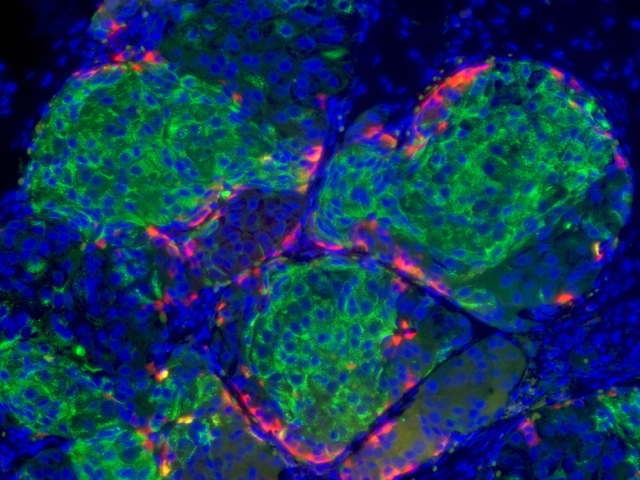
– by Paul Hayes
A new method for converting stem cells to beta cells could speed encapsulated cell replacement product development and research to cure type 1 diabetes
Insulin therapy has long been the only method of treating type 1 diabetes (T1D), but a major breakthrough in producing replacement beta cells is bringing new hope that more effective, alternative treatments may be possible.
According to findings reported in the scientific journal Cell, Breakthrough T1D-supported Harvard University researcher Doug Melton, Ph.D., has developed a method for converting human stem cells (both embryonic and non-embryonic types) into insulin-producing beta cells in the lab. The new method will significantly speed the conversion process. Previous lab methods have only been able to partially complete the conversion process. After reaching a certain point, the immature cells could only mature into fully functioning beta cells after implantation into animals, and the final conversion took months to occur.
Dr. Melton’s new method of driving the full conversion is an important advance towards potential large-scale, rapid production of human beta cells. Currently, sources of human beta cells are largely limited to cadaver donors. Once perfected, however, Dr. Melton’s conversion method could exponentially increase the availability of human beta cells, speeding delivery of novel T1D cell replacement therapies and accelerating basic research on a cure for the disease.
“Breakthrough T1D is thrilled with this advancement toward large scale production of mature, functional human beta cells by Dr. Melton and his team,” said Breakthrough T1D Chief Scientific Officer Richard A. Insel, MD. “This significant accomplishment has the potential to serve as a cell source for islet replacement in people with T1D when used in encapsulated cell-replacement products. It may also provide a resource for discovery of therapies that promote survival or regeneration of beta cells and development of screening biomarkers to monitor beta cell health and survival.”
Breakthrough T1D recently awarded a new multi-million dollar research grant to Dr. Melton, for scaling up production of beta cells using his new method, to hopefully provide a virtually unlimited supply of human beta cells. Dr. Melton will also begin working with other members of the Breakthrough T1D Encapsulation Consortium to conduct animal tests of experimental encapsulation products using this new source of beta cells.